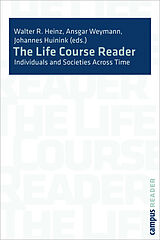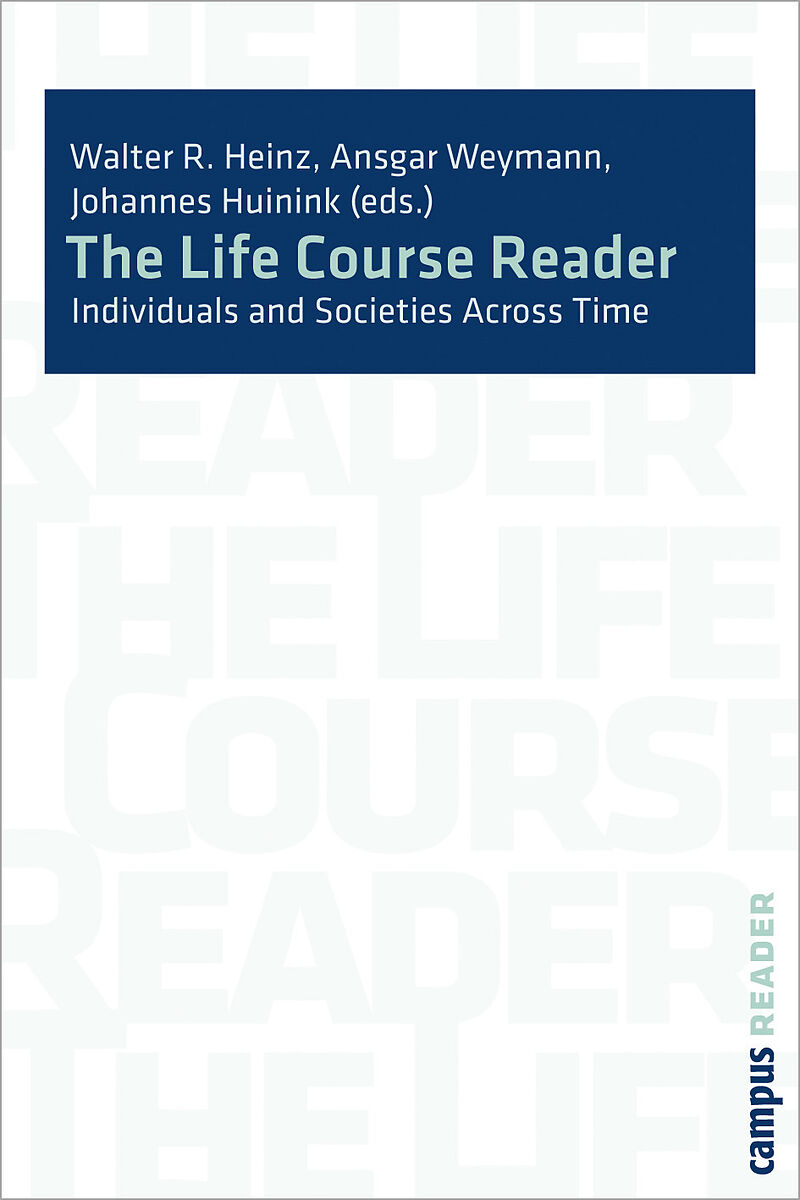The Life Course Reader
Einband:
Kartonierter Einband
EAN:
9783593388052
Untertitel:
Individuals and Societies Across Time
Genre:
Sozialwissenschaften allgemein
Herausgeber:
Campus Verlag GmbH
Auflage:
1. Aufl. 06.2009
Anzahl Seiten:
591
Erscheinungsdatum:
2009
ISBN:
978-3-593-38805-2
Patchworkfamilien, komplizierte Bildungsverläufe, »Erwerbsbiografien«, flexibler Übergang in den Ruhestand heutige Lebensläufe haben mit jenen der Generationen zuvor nur noch wenig gemein. Hierin zeigt sich ein vielgestaltiger sozialer, politischer, wirtschaftlicher und kultureller Wandel in modernen Gesellschaften. Der vorliegende englischsprachige Reader richtet sein Augenmerk auf die wissenschaftliche Beschäftigung mit diesem sozialen und biografischen Wandel die Lebenslaufforschung und analysiert die Wechselwirkungen von Individuum und Gesellschaft. Die Herausgeber versammeln bedeutende theoretische und empirische Texte aus Europa und Nordamerika von Martin Kohli, Jutta Allmendinger, Glen Elder, Angela O'Rand und vielen anderen.
Autorentext
Walter R. Heinz ist Professor em. für Soziologie und Psychologie an der Universität Bremen. Ansgar Weymann ist dort Professor für Soziologie und Direktor des Instituts für empirische und angewandte Soziologie (EMPAS). Johannes Huinink ist ebenfalls Professor für Soziologie an der Universität Bremen.
Klappentext
The course of human lives in Western society is inescapably shaped by political, cultural, and economic factors. Changes in these spheres inevitably lead to changes in our conceptions of everything from childhood and adulthood to family structures and living arrangements. The nineteen articles collected in "The Life Course Reader" offer a range of both theoretical and empirical studies of changing conceptions of the life course. Drawing on data from North America and Europe, the "Reader" will be indispensable for anyone studying human development and the twenty-first century family.
Leseprobe
1. General Introduction Walter R. Heinz, Johannes Huinink, Christopher S. Swader, and Ansgar Weymann Overview The life course approach is today a core research paradigm in the Social Sciences. As a proper methodological basis for the analysis of social processes, it denotes an interrelationship between individuals and society that evolves as a time-dependent, dynamic linkage between social structure, institutions, and individual action from birth to death. In the centre of the life course approach is the fact that "time matters" (Abbott 2001), because aging is a sequence of life phases and transitions that is constructed in a reciprocal process of political, social and economic conditions ("historical time"), welfare state regulations and provisions ("institutional time"), and biographical decisions and investments concerning shifting living circumstances ("individual time"). In view of the multi-temporal relationships between living and working conditions, cultural models, social policy, and individual plans as well as actions, the analysis of modern life courses requires a research strategy that comprises social structure, institutions, and personality on the one side, and longitudinal designs applying relevant quantitative and qualitative methods on the other side. Life course research illuminates how structural and institutional changes affect human lives because it presents theoretically elaborated and empirically grounded investigations into the interrelationship between individuals and society across time. Moreover, it is based on a conceptual and theoretical perspective which invites interdisciplinary efforts to create an integrated social theory. Since its explicit introduction into sociology by Leonard Cain in 1964 (reprinted in Chapter 2), the life course paradigm has become a flourishing field of interdisciplinary research of international scale. Social anthropology, social and cultural history, sociology, political science, gerontology, and social and developmental psychology all contribute to a better understanding of the interrelationships between individual- and social aspects of the processes and phases of aging. These fields respond to the advances in life course studies. Whereas the early definition of the life course by Cain (1964) emphasized the (orderly) sequence of social statuses as a result of aging, today's definitions take into account the interdependency of aging, human agency, historical time and place, linked lives, and the biographical timing of events and transitions (Elder, Johnson and Crosnoe 2003). The high degree of complexity of life course patterns and biographies poses a great challenge to the parsimony demanded by the ideal of an integrated social theory. However, the life course approach offers tools to bring this complexity under control through providing categories, concepts, and methods needed for the task. This collection, providing an overview of life course research over the last four decades, will show both how big the challenge of a multi-level, dynamic analysis of social processes is and what the life course approach offers for mastering it. The collection focuses on the interrelationships between social, economic, cultural, and political change and life courses as well as biographies in modern society. Theorizing the Life Course The life course is a configuration of social and individual components which develops over time. Its complexity is due to at least three kinds of interdependence (cf. Marshall and Mueller 2003; Mayer 2004; Huinink and Feldhaus 2009). First, there is an interdependence of the past, the present, and the future, and thus a path dependence of the life course. Actors learn from the past (though not always with sound conclusions) and are bound to their decisions, which restricts current action and future planning by means of established rules, habits, selective information, and more generally, the transaction costs brought about by innovation. Furthermore, actors are committed to a range of social relationships which create obligations. Since there are life phases of particular bearing for the shaping of biographies, such as status passages from school-to-work or transitions from employment to retirement, actors try to anticipate the potential outcomes of actions for their further living circumstances, including for their social relationships. Second, there is an interdependence between different spheres of action which constitute the multi-dimensionality of the life course. This refers foremost to the fields of family, education, work, leisure and retirement. These are life domains in which individual action and development are embedded. In regard to the life course, these fields compete for resources (such as time and cognitive focus), although activities in various fields can also be combined with each other, as is the case with part-time employment and child rearing or with lifelong learning and work. Third, there is a multi-level interdependence between individual action and political-economic, social, and cultural contexts, which are also interrelated as structural conditions of individual action. Since life course patterns are embedded in macro-social structures and cultural beliefs and guided by market opportunities, institutions, and social networks, their multi-level investigation is critical for explicating the social mechanisms by which societal change modifies opportunities, creates risks, and influences biographies. When social scientists analyze the life course, they focus on historical conditions and events (e.g. economic cycles, wars) and institutional arrangements (e.g. educational systems, labor markets, welfare provisions) insofar as they influence the individual shaping of biographies. However, the supra-individual structure is ultimately the aggregate result of individual choices and actions during the life course (Coleman 1990), to be thus explained by the social construction and symbolic representation of reality and by the figurations created through expanding markets and the democratization of public choice and governance. The level of personality characteristics (self-identity) is also involved, since individual action and decision-making are implied in t…

Leider konnten wir für diesen Artikel keine Preise ermitteln ...
billigbuch.ch sucht jetzt für Sie die besten Angebote ...
Die aktuellen Verkaufspreise von 6 Onlineshops werden in Realtime abgefragt.
Sie können das gewünschte Produkt anschliessend direkt beim Anbieter Ihrer Wahl bestellen.
Loading...
Die aktuellen Verkaufspreise von 6 Onlineshops werden in Realtime abgefragt.
Sie können das gewünschte Produkt anschliessend direkt beim Anbieter Ihrer Wahl bestellen.
| # | Onlineshop | Preis CHF | Versand CHF | Total CHF | ||
|---|---|---|---|---|---|---|
| 1 | Seller | 0.00 | 0.00 | 0.00 |
